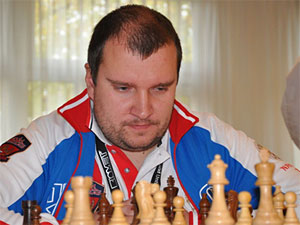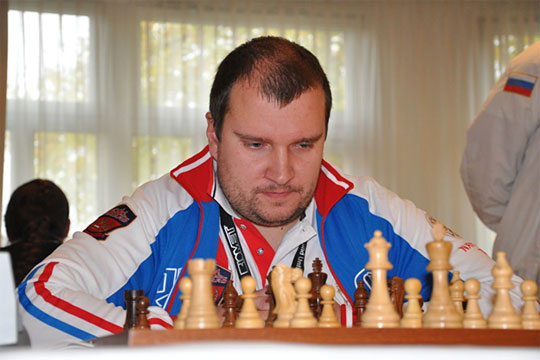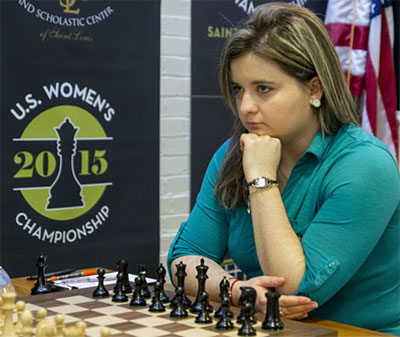



|
Alexey Smirnov wins |
“Winners never quit and quitters never win” – this quote by Vince Lombardi is very apt for each and every participant at the World Disabled Championships 2015 that were held in Dresden, Germany from the 18th to 24th of October 2015. The tournament attracted 63 players from 13 different countries. It was a seven round Swiss event which had an individual tournament, with a separate team ranking. Apart from the title of the World Disabled champion, there were also titles of the winner of braille section, the deaf section and the physically disabled section at stake. In all these categories gold, silver and bronze medals were awarded to the winners.

IM Alexey Smirnov from Russia won the overall event with a score of 6.0/7
Smirnov, who is partially blind, started off the tournament with five wins. Draws in the last two rounds secured him the sole first prize with a score of 6.0/7, half a point ahead of his nearest rivals. The most crucial round was the fifth one in which he took on Stanislav Babarykin. Both the players were on 4.0/4, and the winner would have great chances to claim the title. Alexey Smirnov was tactically alert and managed to win the game.

Stanislav Babarykin lost his game against Smirnov
but scored 5.5 from the remaining
six games to clinch the silver medal
Here is one very nice combination played by Babarykin:
Sergej Wassen – Stanislav Babarykin, round four

White has just played 21.Bb5, attacking the rook on e8. How should Black respond?
Speaking of combinations, there is one game played by the bronze medal winner Stanislav Mikheev which includes a nice little trap in the opening:
Piotr Dukaczewski – Stanislav Mikheev, round five

In a normal hedgehog position White just played 9.f4?!
Mikheev was extremely alert
and took full advantage of this careless move by his opponent. Can you find
it?

IM Piotr Dukaczewski is a living legend. He has been four times blind world champion and ten times Polish National Blind champion. He has won Poland a medal at the Olympiad on four occasions – a Gold in the year 2004. Apart from that he serves as president of the Association of Physical Culture Sports and Tourism of the Blind and Partially Sighted, "Cross", and Vice President of the International Chess Federation of the Blind. He is also a board member of Polish Paralympic Committee.

World Champion Alexey Smirnov with his three
gold medals:
overall disabled world champion, best team and best blind player

The top three medal winners: Gold – Alexey Smirnov of Russia (center), Silver – Stanislav Babarykin (left), Bronze – Stanislav Mikheev (right) are flanked by Zbigniew Pilimon, IPCA President (extreme left) and Lakhdar Mazouz, advisor to the FIDE President for chess development in Africa (extreme right).

Best teams: IBCA from Russia in the background (gold), Ukrainian team (silver) and IPCA from Russia (bronze)

Aleksandra Aleksandrova from Israel was adjudged
best woman player in the tournament. She scored 4.5/7.

Winners of the International Braille Chess
Association (IBCA) 2015 are greeted by GM Thomas Luther.
Gold – Alexey Smirnov (Russia), Silver – Stanislav Babrykin
(Russia), Bronze – Yuri Meshkov (Russia)

Winners of International Chess Committee of
the Deaf (ICCD) 2015: Gold – Vladimir
Kovalenko (Ukraine), Silver – Tomasz Miozga (Poland), Bronze –
Balazs Mate (Hungary)

Winners of the International Physically Disabled
Chess Association (IPCA) 2015:
Gold – Stanislav Mikheev (Russia), Silver – Andrei Gurbanov
(Israel), Bronze – Igor Yarmanov (Ukraine)

The tournament was held in the beautiful Wyndham Garden Hotel

Little kids holding the flags of the participating players from different nations

Dr. Dirk Jordan, the director of the tournament, who ensured that each and every need of the participants would be fulfilled, and the players would experience high class facilities which would enable them to focus on their games. With his enthusiasm and unending energy he is leading a powerful team of nearly 100 smart working chess lovers in the city of Dresden.

Here is one example of how the organizers tried to assist the players in the best way they could. Shailesh Nerlikar (seen in the picture above) suffers from 100% disability. The organizers provided him with an assistant for all the games to make the moves that he would call out. You will know more about Shailesh in an exclusive article soon to be published on our news page.

Snehit Saraf was given a small desk where he could keep his personal chess set and execute the moves

Sergey Tsapalin with his caretaker

The media coverage was also excellent. In the
picture you can see the crew
from Mitteldeutscher
Rundfunk (MDR) recording a short video.

Egmont Pönisch (right) was the chief arbiter. Apart from doing a commendable job in the event, he also organized the first FIDE course for arbiters especially designated for the needs of the disabled chess players.

German GM Thomas Luther visited the event on
its first day.'
He is the head of the FIDE Commission for the disabled and has done important
work.

WGM Sabina Foisor did some exceptional work at the tournament. She not only annotated top ten boards of every round but also made a video on the best game of the day. Here’s the round seven video:
Annotated video of other top games

Lakhdar Mazouz of Algeria, advisor to the FIDE President for chess development in Africa, was present at the closing ceremony. He pointed out that the organization of such championships for disabled players is an immense step forward in development of chess, not only for disabled players, but for all other chess fans in general.

Bharat Singh, the CEO of All India Chess Federation
and the chairman of the
FIDE technical commission, inaugurates the round by making the first move

Yvonne Ledfuss, the PR officer of the ZMDI chess festival and tournament manager of the WCCD 2015

Organizing such an event without a good team is an impossible task!

All the pictures in this report were taken by Karsten Wieland. Dressed in jeans and green polo shirt, for the first 15 minutes in every round he worked as a photographer. Then he would change into a black suit and become an arbiter, where he would solve problems faced by the participants.
The 2015 World disabled Championships was truly a congregation of the most courageous chess players from all over the world. Players suffering from various disabilities travelled thousands of kilometers to play the game of chess with each other. It just shows how powerful and special chess really is. It has the ability to change one’s life for the better. Dresden and Dr. Dirk Jordan did a phenomenal work of organizing the event in 2013 and 2015. The city would be organizing the 2017 edition as well.
There has been a huge debate whether separate titles (WIM/WGM) should be kept for the women players. Whether we should keep these titles or not is a completely different topic of debate. But if women players have easier rules for achieving their titles, it definitely makes sense to have less strenuous title requirements for the disabled people. They are surely at a disadvantage as compared to a normal player. Every disabled chess player above a certain percentage of disability can make his GM title if he achieves, say, a rating of 2300. The specifics can be decided by a special committee of FIDE. But I definitely think that this would be a positive step forward.
Pictures by Karsten Wieland
LinksYou can use ChessBase or any of our Fritz compatible chess programs to replay the games in PGN. You can also download our free Playchess client, which will in addition give you immediate access to the chess server Playchess.com. |